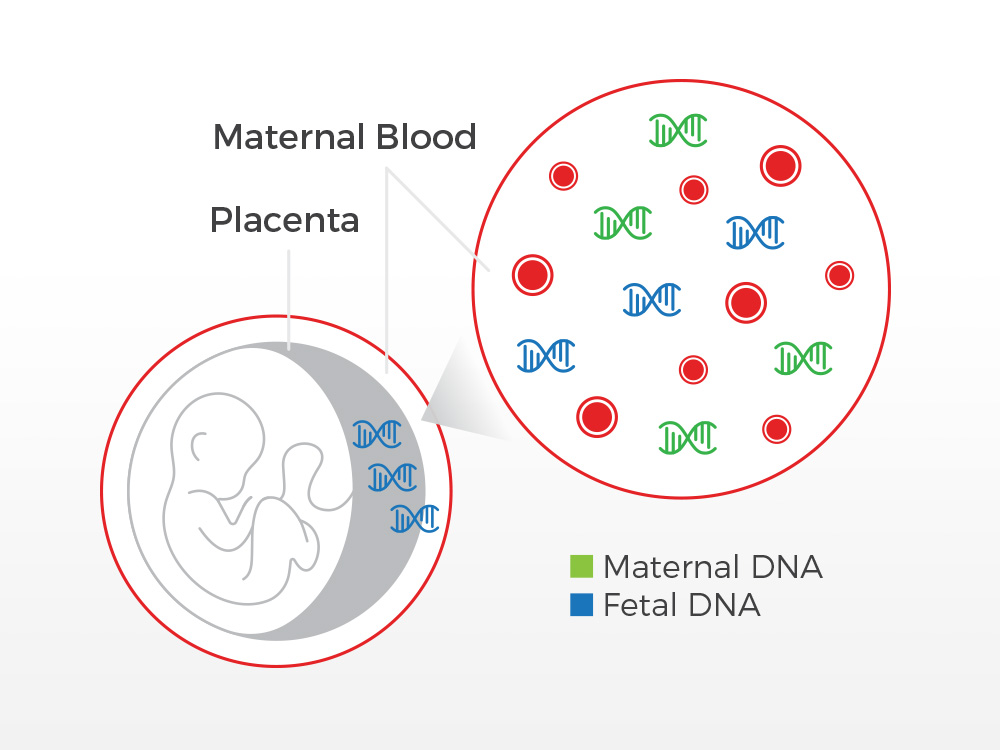Non-Invasive Prenatal Paternity Testing
Easily establish paternity before your baby is born.
Payment Plans Available – Starting at £399
Can I get a paternity test while pregnant?
Yes. We understand that the uncertainity surrounding your baby’s paternity can be very stressful during your pregnancy. DDC is here to help you establish paternity as early as 7 weeks into your pregnancy. Our Certainty™ Non-Invasive Prenatal Paternity Test is the first and only prenatal test accredited by the AABB, and completely safe for both mum and baby. You should receive your results in just 3-5 business days. We guarantee that you will receive a result, or we will fully refund your testing fee. Contact our experts today for a free consultation.
How does the non-invasive prenatal test work?
Arrange Sample Collection
The test requires a blood sample from the mother and cheek-swab sample from the possible father. We’ll help you locate a DNA-collection facility near you.
Up to 2,688 Genetic Markers Tested
Fetal DNA combines with the mother’s by passing into the mother’s bloodstream. The fetal DNA is isolated and analyzed during the testing process, and then compared to the possible father’s.

Results in 5 Business Days or Less
Once all samples arrive at the lab, the report is posted to your secure online account within 5 business days. You can choose 3-day results for an extra fee, and gender determination is also optional.
Why choose DDC for non-invasive prenatal testing?
- Our lab has a reputation for excellence that is second to none.
- The non-invasive prenatal paternity test from DDC is the first and only one accredited by the AABB.
- Our test gives you an accurate paternity answer without any risk to you or the pregnancy— it’s completely safe.
- We guarantee results or your testing fee will be refunded.
Contact us for a no-obligation, FREE consultation.
Non-Invasive Prenatal Paternity Testing: What You Need to Know
Call to Order: Contact our experts for a no-obligation consultation on 0800 009 2969. You can choose legal or peace-of-mind results, and we’ll help you arrange a DNA-collection appointment at a time and place convenient for you.
Restrictions for Paternity Testing While Pregnant:
- A woman must be at least 7 weeks pregnant to test.
- A prenatal paternity test cannot be performed for a woman expecting twins or multiples.
- We cannot perform testing with two possible fathers who share a close biological relationship.
What to Watch Out for When Choosing a Laboratory for your Test: Your paternity test is important and can be a factor in making critical life choices. You may find companies online advertising cheap non-invasive prenatal paternity tests. Beware of these claims, and ask to see the actual published research supporting these tests. If a company offers a free postnatal test, it may mean they don’t stand behind the quality of their prenatal test.
Our Certainty™ Non-Invasive Prenatal Paternity test is the only prenatal paternity test accredited by the AABB and features the most advanced scientific methods and DNA high-sequencing instruments. DDC is one of the most trusted laboratories in the world, capable of delivering quality results to our most important client—you.
Results are completely confidential, and your private genetic information is never shared with or sold to outside parties.
See our privacy policy here.
For a no-obligation, FREE consultation, call 0800 009 2969
More about Prenatal Paternity Testing
Q: How early in the pregnancy can a non-invasive prenatal paternity test be performed?
A: The DDC test can be performed as early as 7 weeks into the pregnancy. In some cases, there may not be enough free-floating fetal DNA in the mother’s bloodstream at the time of initial sample collection. In these cases, we’ll schedule a second sample collection two weeks later at no additional cost.
Q: Is the non-invasive prenatal paternity test safe?
A: Yes, the DDC prenatal paternity test is completely safe for both the mother and the pregnancy. In the past, paternity could only be determined through invasive methods such as amniocentesis or CVS (Chorionic Villus Sample), which run a slight risk of miscarriage.
Q: Can a prenatal paternity test be performed if the possible fathers are related?
A: No; because of the way the data is analyzed, a prenatal paternity test cannot be performed reliably if possible fathers are closely related (brothers, or father/son).
Q: Can a non-invasive prenatal paternity test be performed if the mother is pregnant with twins?
No, a prenatal paternity test cannot be performed if the mother is pregnant with twins or multiples.
Q: Does a prenatal paternity test always have to be legally witnessed?
A: No, a prenatal paternity test does not have to be a witnessed test with court-admissible results. The DNA sample for the possible father is a cheek swab, whereas the mother’s is a small blood sample. Many of our customers swab a possible father themselves at home while the mother goes to a clinic or other approved facility to have her blood drawn. However, in order for results to be legally-admissible and for names to be on the test report, the possible father’s DNA collection does have to be witnessed by an approved, independent third party.
Q: Is the DDC prenatal paternity test accredited?
A: Yes. The DDC prenatal paternity test is accredited by the AABB. AABB is the global leader in standards development, accreditation, and implementation of quality systems in transfusion medicine and cellular therapies. This is the first non-invasive prenatal paternity test accredited by the AABB, and only DDC maintains the organization’s strict accreditation standards of accountability for prenatal DNA paternity testing, including analysis, PhD review, and documentation.


